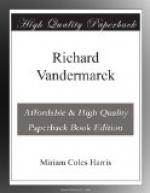“Why, Pauline! child! what is it?” cried Mrs. Hollenbeck, as the music ceased and Mr. Langenau. again came back to the circle round the table. Every one looked: I was choking with sobs.
“Oh, don’t, I don’t want you to speak to me,” I cried, putting away her hand and darting from the room. I was not ashamed of myself, even when I was alone in my room. The powerful magic lasted still, through the silence and darkness, till I was aroused by the voices of the others coming up to bed.
Mrs. Hollenbeck knocked at my door with her bedroom candle in her hand, and, as she stood talking to me, the others strayed in to join her and to satisfy their curiosity.
“You are very sensitive to music, are you not?” said Charlotte Benson, contemplatively. She had tried me on Mompssen, and the “Seven Lamps,” and found me wanting, and now perhaps hoped to find some other point less faulty.
“I do not know,” I said, honestly. “I seem to have been very sensitive to-night.”
“But you are not always?” asked Henrietta Palmer. “You do not always cry when people sing?”
“Why, no,” I said with great contempt. “But I never heard any one sing like that before.”
“He does sing well,” said Mrs. Hollenbeck, thoughtfully.
“Immense expression and a fine voice,” added Charlotte Benson.
“He has been educated for the stage, you may be sure,” said Mary Leighton, with a little spite. “As Miss d’Estree says, I never heard anyone sing like that, out of the chorus of an opera.”
“Well, I think,” returned Charlotte Benson, “if there were many voices like that in ordinary choruses, one would be glad to dispense with the solos and duets.”
“Oh, you would not find his voice so wonderful, if you heard it out of a parlor. It is very well, but it would not fill a concert hall, much less an opera house. No; you may be sure he has been educated for some of those German choruses; you know they are very fine musicians.”
“Well, I don’t know that it is anything to us what he was educated for,” said Charlotte Benson, sharply. “He has given us a very delightful evening, and I, for one, am much obliged to him.”
“Et moi aussi" murmured Henrietta, wreathing her large beautiful arms about her friend, and the two sauntered away.
Mary Leighton, in general ill-humor, and still remembering the walk of the last evening, desired to fire a parting-shot, and exclaimed, as she went out, “Well, I think it is something to us; I like to have gentlemen about me.”
“You need not be uneasy,” said Mrs. Hollenbeck, a little stiffly. “I think Mr. Langenau is a gentleman.”
But at this moment his step was heard in the hall below, and there was an end put to the conversation.
CHAPTER VI.
MATINAL.
Last night, when some one spoke his name,
From my swift blood that went and came
A thousand little shafts of flame
Were shivered in my narrow frame.




